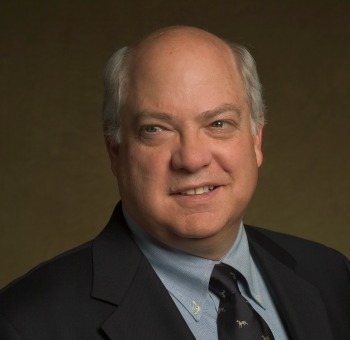
After James O'Rourke IV earned his bachelor of business administration in management at Notre Dame in 1968, he took a commission in the U.S. Air Force and spent years moving around the world – Pennsylvania, Ireland, New Mexico, Labrador, New York, Colorado, United Kingdom, Indiana. He picked up master’s degrees in communication from Temple University and speech from the University of New Mexico and a Ph.D. in communication from Syracuse University with further study at Cambridge University. He worked on a flight test squadron for the Air Force and taught English and communication.
O’Rourke returned to Notre Dame 24 years ago to establish the Fanning Center for Business Communication, which has grown to five faculty members. “We teach across six degree programs in the business school,” he says. “We teach graduates as well as undergraduates. We teach the full range of courses in communication beginning at the tactical end with skills focused on writing and speaking and at the strategic end with courses that involve negotiation, corporate communication, intercultural communication, and conflict management.”
O’Rourke also has taught ESTEEM students since the beginning of the program. “I like the program primarily because of the very high quality of the students that are now enrolled,” he says. “These are people with seriously good ideas who are hoping somehow to commercialize their scientific and engineering expertise. The idea in many ways is to give people who have been focused on math, science, engineering, technology – the STEM fields -- some business acumen starting with vocabulary and basic concepts to provide them with the ability to read an income statement, to read a balance sheet, and to speak with the business community.”
Scientists and engineers, who may be more risk-averse than investors, must learn to communicate with business leaders to translate their discoveries and inventions into social good, he says. “You don’t get there without communication skills,” O’Rourke says. “Business practitioners and executives don’t understand much of science and engineering. Scientists and engineers have to speak to the business community in a language they understand. They have to understand why you have to make a profit. They have to understand the process by which you control intellectual property.
“Our course teaches them first of all how to explain their technology in terms that even members of their own family could now understand and how to explain what they do to a venture capitalist. The venture capitalist is looking for the opportunity to bring something to market that will be of value to enough people to warrant the risk involved. It’s balancing risk and return and showing someone with money and an appetite for risk how to manage and exploit the technology being developed here.”
Engagement with ESTEEM students provides an important experience of the process by which ideas become businesses and reach the market, O’Rourke says. “For me, it’s been an enormous privilege to hear the ideas of these students, to explore their interests, and to see where the marketplace might find a home for them,” he says. “The ESTEEM students are still very much focused on their own research and the research of the mentors and faculty at Notre Dame who have taken them in. It is a fascinating and privileged viewpoint for those of us in the business school. It’s wonderful to collaborate across classic academic boundaries.
“This is an interesting and valuable partnership. This is a place where they can develop those skills, receive personal coaching, and ultimately through the Mendoza College of Business participate in business plan competitions and meet people who are looking for new ideas to launch.”